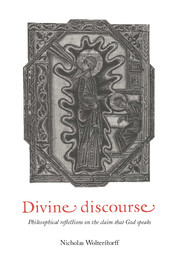Book contents
- Frontmatter
- Contents
- Preface
- 1 Locating our topic
- 2 Speaking is not revealing
- 3 The many modes of discourse
- 4 Divine discourse in the hands of theologians
- 5 What it is to speak
- 6 Could God have and acquire the rights and duties of a speaker?
- 7 Can God cause the events generative of discourse?
- 8 In defense of authorial-discourse interpretation: contra Ricoeur
- 9 In defense of authorial-discourse interpretation: contra Derrida
- 10 Performance interpretation
- 11 Interpreting the mediating human discourse: the first hermeneutic
- 12 Interpreting for the mediated divine discourse: the second hermeneutic
- 13 Has Scripture become a wax nose?
- 14 The illocutionary stance of biblical narrative
- 15 Are we entitled?
- 16 Historical and theological afterword
- Notes
- Index
16 - Historical and theological afterword
Published online by Cambridge University Press: 01 June 2011
- Frontmatter
- Contents
- Preface
- 1 Locating our topic
- 2 Speaking is not revealing
- 3 The many modes of discourse
- 4 Divine discourse in the hands of theologians
- 5 What it is to speak
- 6 Could God have and acquire the rights and duties of a speaker?
- 7 Can God cause the events generative of discourse?
- 8 In defense of authorial-discourse interpretation: contra Ricoeur
- 9 In defense of authorial-discourse interpretation: contra Derrida
- 10 Performance interpretation
- 11 Interpreting the mediating human discourse: the first hermeneutic
- 12 Interpreting for the mediated divine discourse: the second hermeneutic
- 13 Has Scripture become a wax nose?
- 14 The illocutionary stance of biblical narrative
- 15 Are we entitled?
- 16 Historical and theological afterword
- Notes
- Index
Summary
When it came time, in the course of our kaleidoscopic look at the notion of God speaking, to consider issues of interpretation, I greatly narrowed the focus of my attention. Suppose, I said, that one considered the human discourse of the Christian Bible to be an instrument of divine discourse; how would one go about interpreting it so as to discern that divine discourse? To forestall the objection that this was a purely fanciful supposition, with no tie to reality, I observed that for centuries the Christian Bible was thought of in exactly this way; God speaks by way of these writings.
Is there good reason to believe that the Bible is a medium of divine discourse?
But is there good reason for supposing that the Christian Bible is in fact a medium of divine discourse – and thus for preferring, over all its competitors, the interpretative practice which operates on that assumption? That question will have been on the mind of all my readers; I have said nothing at all by way of answering it. When it came time to reflect on epistemological issues, I concentrated on entitlement rather than justification, posing the question whether normal, well-educated human beings of the twentieth century are ever entitled to believe that God speaks; and I answered the question by focusing on a case in which extraneous issues – such as that of entitlement to believe human testimony – were reduced to a minimum.
- Type
- Chapter
- Information
- Divine DiscoursePhilosophical Reflections on the Claim that God Speaks, pp. 281 - 296Publisher: Cambridge University PressPrint publication year: 1995



